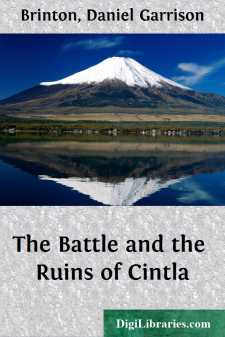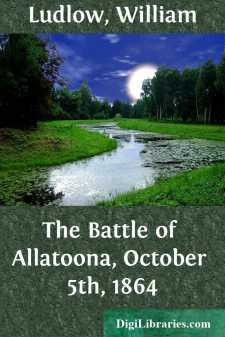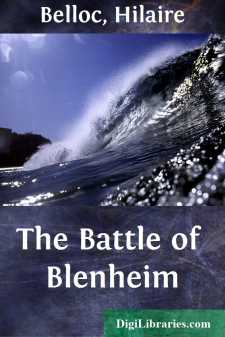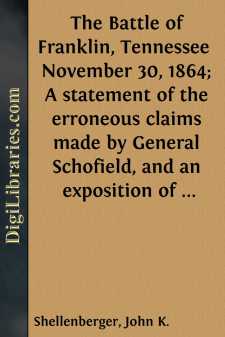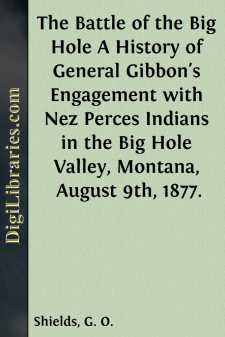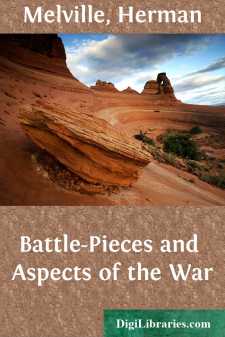Fiction
- Action & Adventure 180
- Biographical 15
- Christian 59
- Classics
- Coming of Age 5
- Contemporary Women 3
- Erotica 8
- Espionage/Intrigue 12
- Fairy Tales, Folklore & Mythology 236
- Family Life 169
- Fantasy 117
- Gay 1
- General 596
- Ghost 32
- Historical 808
- Horror 43
- Humorous 160
- Jewish 25
- Legal 4
- Medical 22
- Mystery & Detective 315
- Political 49
- Psychological 41
- Religious 64
- Romance 159
- Sagas 11
- Science Fiction 730
- Sea Stories 113
- Short Stories (single author) 537
- Sports 10
- Suspense 1
- Technological 8
- Thrillers 2
- Urban Life 31
- Visionary & Metaphysical 1
- War & Military 173
- Westerns 199
Classics Books
Sort by:
The first battle on the American continent in which horses were used was that of Cintla in Tabasco, March, 1519, the European troops being under the leadership of Hernando Cortes. This fact attaches something more than an ordinary historic interest to the engagement, at least enough to make it desirable to ascertain its precise locality and its proper name. Both of these are in doubt, as well as the...
more...
CHAPTER I On Board the “President Lincoln” The mounting flames of a bonfire cast a flickering red light down the battery street. Burning the whole night through, to consume boxes, refuse and abandoned material of various kinds, these ruddy illuminations in the quarters of the 149th Field Artillery, at Camp Mills, Long Island, were omens of unusual, and unpublished, happenings. The men of the...
more...
by:
William Ludlow
ALLATOONA. Companions and Gentlemen: It appears strange to me that an action which all who mention it—and they are many—agree in characterizing as one of the most brilliant exploits of a war as thickset with deeds of gallantry as a rose bush with its blossoms, should not long since have had its adequate historian and monographer. The contest was so famous, the issue so glorious, the recollection of...
more...
"DE HINE FOOT ER A HE FRAWG" Toward the close of an early summer afternoon, a little girl came running along the turnpike to where a boy stood wriggling his feet in the dust. "Old Aunt Ailsey's done come back," she panted, "an' she's conjured the tails off Sambo's sheep. I saw 'em hanging on her door!" The boy received the news with an indifference from...
more...
by:
Hilaire Belloc
PART I THE POLITICAL OBJECTIVE The proper understanding of a battle and of its historical significance is only possible in connection with the campaign of which it forms a part; and the campaign can only be understood when we know the political object which it was designed to serve. A battle is no more than an incident in a campaign. However decisive in its immediate result upon the field, its value to...
more...
Frank Aretas Haskell was born at Tunbridge, Vermont, the son of Aretas and Ann (Folson) Haskell, on the 13th of July, 1828. Graduating from Dartmouth College with distinguished honors, in the class of 1854, the young man came to Madison in the autumn of that year, and entered the law firm of Orton, Atwood & Orton. His career in this profession was increasingly successful, until in 1861 it was...
more...
PREFACE This monograph on the Battle of Franklin was read first at a meeting of the Minnesota Commandery of the Loyal Legion, December 9, 1902. Written after an exhaustive investigation begun many years before, the straightforward truth was told without fear or favor. The disgraceful and costly blunder with which the Battle of Franklin opened should have been investigated by a court of inquiry. The...
more...
by:
Gilbert Parker
INTRODUCTION This book is a protest and a deliverance. For seven years I had written continuously of Canada, though some short stories of South Sea life, and the novel Mrs. Falchion, had, during that time, issued from my pen. It looked as though I should be writing of the Far North all my life. Editors had begun to take that view; but from the start it had never been my view. Even when writing Pierre...
more...
by:
G. O. Shields
CHAPTER I. The Nez Percé Indians are a powerful and populous tribe, who, for centuries, have made their home in the Snake, Salmon, and Clear Water Valleys in Washington, Oregon, and Idaho. When the great tide of civilization, which for years flowed toward the Pacific Coast, finally spread out into these valleys, questions arose between the emigrants and Indians as to the ownership of certain lands...
more...
by:
Herman Melville
Misgivings. (1860.) When ocean-clouds over inland hills Sweep storming in late autumn brown, And horror the sodden valley fills, And the spire falls crashing in the town, I muse upon my country's ills— The tempest bursting from the waste of TimeOn the world's fairest hope linked with man's foulest crime. Nature's dark side is heeded now— (Ah!...
more...


